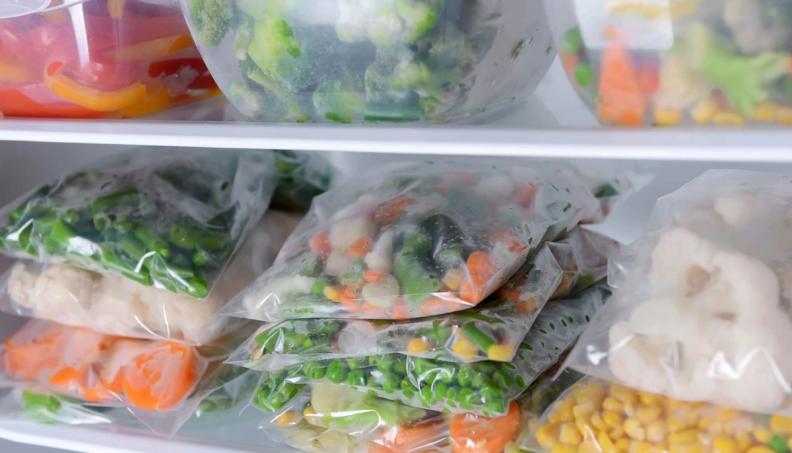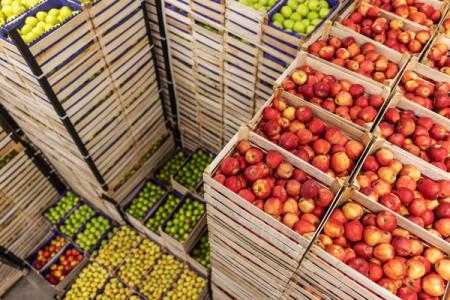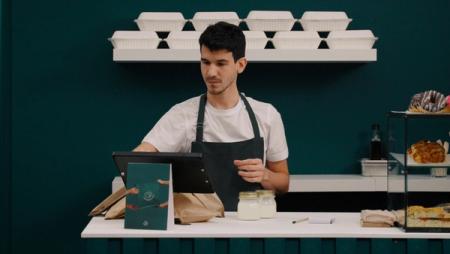Insert excerpt
Yes, you can freeze that!
Insert excerpt
Yes, you can freeze that!

Ah, the humble freezer... ❄️ That magic machine that stops time, letting us enjoy peak produce in the off-season, and relive special meals and memories after the fact.
This household appliance is also a great sidekick in the fight against food waste. We know that the holidays are the time of year where we see the most food go to waste, but it doesn't have to be the case. Most of your favorite holiday foods can be frozen. We're here to show you how to freeze like a pro.
Firstly, always freeze food in the portions sizes you’ll want to reheat later. Although freezing food once is great, thawing and then refreezing isn’t recommended. Unless you live with a big family, we recommend you to freeze the food in small portions, using containers that are the right size for the job💡
There are some foods we all know can be frozen. Oven fries, fruits and veggies are sold this way... but others will surprise you! Read on below to learn what can be frozen - and for how long.
Grains
🕰 ❄️ Cooked rice and pasta: 2-3 months
Put the still-hot extra rice straight into an airtight container for freezing. It’s very important with rice to cool it well before putting it in the fridge or freezer. Do this by putting the container into a bowl of cold water. When you later thaw the rice, either in the microwave (covered with a little water) or in the refrigerator, it will maintain a stable temperature.
If you would like to freeze pasta, add a tsp. of olive oil when cooling it and store it in a freezer bag, removing the air. Pro tip: cooking your noodles al dente is both delicious and will ensure that it won’t become overly soft when you re-heat it.
Cheese
🕰 ❄️ Hard cheese (e.g. parmesan, pecorino) - 8 months
🕰 ❄️ Semi-hard cheese (e.g. gouda) - 2-8 months
🕰 ❄️ Soft cheese (mozzarella, brie, etc.) - not ideal for freezing
Put the cheese in an airtight container and keep it for when you need it. Bear in mind that the quality does decrease slightly, but it will remain just as good as long as you consume it in the indicated time.
Extra tip: If you grate hard cheese before you freeze it, you can easily access a handful at a time when you're making your next pasta dish 🤗
Meat
🕰 ❄️ Lean meats (beef steaks, chicken, turkey, etc.) - 6 to 12 months
🕰 ❄️ Fatty meats (e.g. pork chops) - 3 to 6 months
🕰 ❄️ Ground meat - 3 to 4 months
🕰 ❄️ Very fatty meats (bacon or fresh sausages) - 1 to 2 months
These can all be frozen both raw and cooked. However, once raw meat is defrosted, it should never be frozen again. Use your senses and divide into the portions you'd use.
Potatoes
🕰 ❄️ 6-8 months
Even though we see frozen potatoes across all supermarkets, the truth is potatoes do not answer well to freezing, as taste and texture can really change. If you’ve cooked a big batch of potato soup, we recommend you keep it in the fridge or share the dish with your loved ones. But if you have simply chopped a few too many, or have made purée, then following a few simple tricks will make them last in the freezer for months.
Raw potatoes: no need even to chop, just wash, and boil them for five minutes. When cool, they’re ready to freeze in an airtight container.
French fries: For best results, half-fry (before they reach 100% cooked) in sunflower oil (not olive oil), let them cool and freeze them in an airtight container.
Cooked potato purée is fine to keep in the freezer, although it might change its texture a bit. If it happens, just put it in the mixer again and it’ll be ready to go!
Herbs
🕰 ❄️ 6 months
This can work for basil, cilatro, parsley, mint, oregano, thyme, rosemary...
1. Chop the herbs
2. Place them in one or more ice cube trays.
3. Add a little water / olive oil (depending on the dish you want to make later).
They will be ready to use for any occasion!
We're sharing tips to make the holidays last longer on our social channels and blog all week long. Stay tuned!


